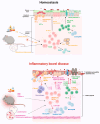Innate Lymphoid Cells in Inflammatory Bowel Disease
- PMID: 40498001
- PMCID: PMC12155180
- DOI: 10.3390/cells14110825
Innate Lymphoid Cells in Inflammatory Bowel Disease
Abstract
Inflammatory bowel disease (IBD), including Crohn's disease and ulcerative colitis, is a chronic inflammatory disorder of the gastrointestinal tract with rising incidence and an unclear etiology. Innate lymphoid cells (ILCs) have recently emerged as key regulators of mucosal immunity and tissue homeostasis and are increasingly implicated in IBD. Unlike adaptive lymphocytes, ILCs do not require antigen recognition and clonal expansion to respond rapidly to environmental cues and shape immune responses. In a healthy gut, ILCs maintain intestinal homeostasis by guarding the epithelial barrier, protecting against pathogens, and mounting proper responses to external insults. However, their altered differentiation, proliferation, recruitment, activation, and interaction with other host cells, microbiota, and environmental stimuli may contribute to IBD. In this review, we discuss recent advances in understanding murine and human ILCs in the context of intestinal inflammation and IBD. A deeper understanding of ILC-mediated immune mechanisms may offer novel therapeutic strategies for restoring intestinal homeostasis and improving personalized management of IBD.
Keywords: animal models; inflammatory bowel disease; innate lymphoid cells; mucosal immunity; novel therapies.
Conflict of interest statement
The authors declare no conflicts of interest.
Figures


Similar articles
-
Innate Lymphoid Cells in Intestinal Homeostasis and Inflammatory Bowel Disease.Int J Mol Sci. 2021 Jul 16;22(14):7618. doi: 10.3390/ijms22147618. Int J Mol Sci. 2021. PMID: 34299236 Free PMC article. Review.
-
Group 3 ILCs: Peacekeepers or Troublemakers? What's Your Gut Telling You?!Front Immunol. 2019 Apr 5;10:676. doi: 10.3389/fimmu.2019.00676. eCollection 2019. Front Immunol. 2019. PMID: 31024537 Free PMC article. Review.
-
Innate Lymphoid Cells in Inflammatory Bowel Disease.Arch Immunol Ther Exp (Warsz). 2018 Dec;66(6):415-421. doi: 10.1007/s00005-018-0519-5. Epub 2018 Aug 29. Arch Immunol Ther Exp (Warsz). 2018. PMID: 30155762 Review.
-
Cross-talk between type 3 innate lymphoid cells and the gut microbiota in inflammatory bowel disease.Curr Opin Gastroenterol. 2015 Nov;31(6):449-55. doi: 10.1097/MOG.0000000000000217. Curr Opin Gastroenterol. 2015. PMID: 26398682 Free PMC article. Review.
-
Innate Lymphoid Cells: A Link between the Nervous System and Microbiota in Intestinal Networks.Mediators Inflamm. 2019 Jan 20;2019:1978094. doi: 10.1155/2019/1978094. eCollection 2019. Mediators Inflamm. 2019. PMID: 30804706 Free PMC article. Review.
References
-
- Alatab S., Sepanlou S.G., Ikuta K., Vahedi H., Bisignano C., Safiri S., Sadeghi A., Nixon M.R., Abdoli A., Abolhassani H., et al. The global, regional, and national burden of inflammatory bowel disease in 195 countries and territories, 1990–2017: A systematic analysis for the Global Burden of Disease Study 2017. Lancet Gastroenterol. Hepatol. 2020;5:17–30. doi: 10.1016/S2468-1253(19)30333-4. - DOI - PMC - PubMed
-
- Lewis J.D., Parlett L.E., Jonsson Funk M.L., Brensinger C., Pate V., Wu Q., Dawwas G.K., Weiss A., Constant B.D., McCauley M., et al. Incidence, Prevalence, and Racial and Ethnic Distribution of Inflammatory Bowel Disease in the United States. Gastroenterology. 2023;165:1197–1205.e1192. doi: 10.1053/j.gastro.2023.07.003. - DOI - PMC - PubMed
Publication types
MeSH terms
Grants and funding
LinkOut - more resources
Full Text Sources

